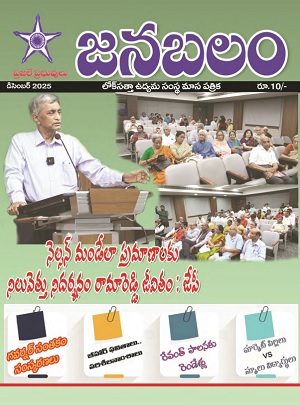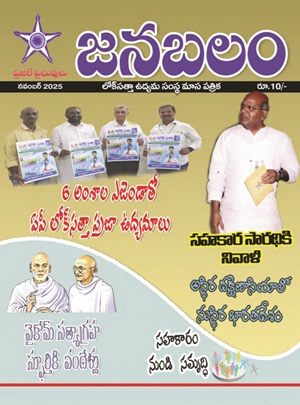The Vice President of India and the Union Law Minister have expressed their support in principle to electoral reforms and certain key bills which the Lok Satta has proposed to empower people in politics and governance.
Lok Satta Party national President Dr. Jayaprakash Narayan gave this information in a media statement here today. During his visit to New Delhi on February 19 and 20, Dr. JP met a number of key people in the Government and political parties seeking their support for electoral, judicial and panchayat raj reforms and Bills.
In his discussions with Vice President Dr. Hamid Ansari, Dr. JP underlined the importance of proportional representation system to enable the best and the brightest to contest elections without the need for tainted money and muscle power, constitution of a National Judicial Commission to ensure judicial appointments without political interference and an Indian Judicial Service to enable the competent to enter the judiciary. Dr. Hamid Ansari told Dr. JP he would do his best to ensure that the reforms take shape.
Union Law Minister Aswini Kumar pledged his support to the Lokpal Bill to eradicate corruption, Citizens' Services Guarantee Bill to extend Government services as a matter of right in a specified period, and Bills to constitute a National Judicial Commission and Indian Judicial Service. The, Lok Satta at the instance of the Parliamentary Standing Committee, had prepared a single Bill to cover both general and electronic services. The Union Law Minister promised to get the Services Guarantee Bill along with the Lokpal Bill passed in Parliament. Dr. JP also discussed electoral reforms including the proportional system of representation with the Law Minister.
Dr. JP held wide-ranging discussions with Mr. Mani Shankar Aiyar, Chairman and members of the committee of experts appointed by the Union Rural Development Ministry to suggest measures for improving services in panchayats. Constitution of one council to look after the entire administration in a district and ensuring a per capita grant of Rs.1000 in all village panchayats formed part of the discussions.
Dr. JP in his discussions with the expert committee suggested the following reforms:
1. Reconstitution of village panchayats or formation of panchayat clusters to ensure that such an entity has a minimum population of 10,000. Such a panchayat should have an office with all modern ITC facilities, high school, hospital, veterinary hospital, market yard for farmers, bus station, mobile court and bank branch.
2. Mandatory implementation of citizen's charter in every village to ensure that Government services are extended in a specified period and payment of compensation in case of delay.
3. Computerization of treasuries all over the country to ensure that funds released by the Central Government are routed to institutions directly.
4. At least 50 percent of the Rs.1,80,000 crore released by the Union Government for various schemes annually should be routed directly to panchayat raj institutions, especially village panchayats. Allocation of the lion's share of funds to panchayats will facilitate a per capita grant of Rs.1000. It will help panchayats address a number of local problems and ensure participation of citizens in politics and local administration. An ombudsman can be constituted at the district level to prevent corruption in utilization of funds and facilitate attachment of properties and removal of the corrupt from offices.
5. There should be a council at the district level bringing all municipalities and village panchayats under its purview.
Mr. Mani Shankar Aiyar welcomed the proposals and promised appropriate measures from the Government-end.
Dr. JP, who had already met President Pranab Mukherjee, said that he would be meeting leaders of all main political parties soon and try to build a consensus for fundamental reforms. The Lok Satta, he said, believed that the Government and political establishments would help usher in reforms to ensure a bright future for India.
Saturday, February 23, 2013
Dr. JP enlists central leaders' support for electoral, judicial and panchayat reforms
Subscribe to:
Post Comments (Atom)





No comments:
Post a Comment